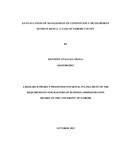| dc.contributor.author | Oenga, Kennedy N | |
| dc.date.accessioned | 2013-11-20T11:47:48Z | |
| dc.date.available | 2013-11-20T11:47:48Z | |
| dc.date.issued | 2013-10 | |
| dc.identifier.citation | Master Of Business Administration, University Of Nairobi, 2013. | en |
| dc.identifier.uri | http://erepository.uonbi.ac.ke:8080/xmlui/handle/123456789/59602 | |
| dc.description.abstract | Constituency Development Fund is a fund created by the Government. This Fund which was enactment in 2003 has significantly changed development dynamics at community level such that the constituency has increasingly become an important unit of engagement in development projects in Kenya. The main objective of the study was to assess the effectiveness of management of Constituency Development Funds in Nairobi County. The CDF forms one of the devolved funds channeled by central government. The CDF is aimed at spurring development in the constituencies. CDF resources are generated from tax collected from Value Added Tax (VAT), Income tax paid by salaried employees, duty paid on manufactured and imported goods and fees charged on licenses. Main focus of this study is quantitative. However some qualitative approach was used in order to gain a better understanding and possibly enable a better and more insightful interpretation of the results from the quantitative study. This research study will adopt a descriptive research design approach. The descriptive design deems appropriate because the main interest was to establish the relationship and analyze how the technical determinants supports matters under analysis in one organization. Quantitative data collected using questionnaires was analyzed by the use of descriptive statistics using Statistical Package for Social Sciences (SPSS). Content analysis was used to analyze data collected from the open ended questions that is of qualitative nature.
The study revealed that majority of the respondents were aware of the CDF projects and that the respondent’s category affects performance of constituency development fund. The study also found out that MPs were directly involved in implementing of CDF projects and that implementation entails coordinating people and resources in order to be successive. It was further revealed that the projects were not implemented in a timely manner and that implementation process involves performing the activities of the project in accordance with the project management plan. It was however revealed that majority of the stakeholders were not directly involved in making decisions on which projects were to be funded by CDF. The study concludes that there is a positive association between effectiveness of CDF management with implementation, monitoring, accounting/recording and stakeholder effect.
The study recommends that further study may be conducted on the effects of not completing CDF projects on a timely manner. Further study may also be conducted on the resource utilization on CDF. Further study may also be conducted on the effects of not using proper procurement procedures while undertaking CDF projects. Finally, further study may also be conducted on the effect of human resources engaged in the implementation of CDF projects. | en |
| dc.language.iso | en | en |
| dc.publisher | University of Nairobi | en |
| dc.title | An evaluation of management of constituency development funds In Kenya: A Case of Nairobi County | en |
| dc.type | Thesis | en |
| local.publisher | School of Business | en |

